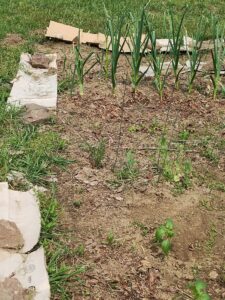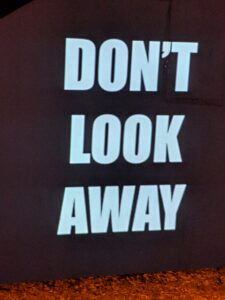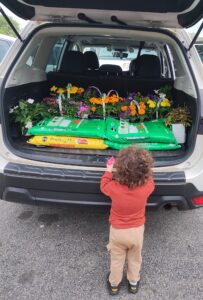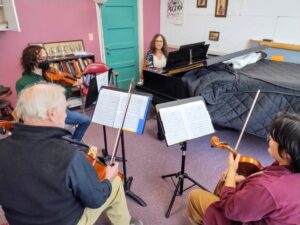My intent today was to write not about the fog of grief that’s encapsulated me in so many ways over the past two months, but about the process of clawing back my life. Yet, this morning in one of my favorite Zoom writing groups, I think it was one of those spiritually serendipitous accidents that Elizabeth Bishop’s poem, The Art of Losing, was offered as a lead-in to the writing prompt.
Lose something every day, Bishop writes, evoking objects as mundane as door keys and as complex as rivers.
And in her last verse:
—Even losing you (the joking voice, a gesture
I love) I shan’t have lied. It’s evident
the art of losing’s not too hard to master
though it may look like (Write it!) like disaster.
We’re in that all-too-short week of spring where everything’s blooming, but nothing’s quite leafed out, and yesterday, on a walk at the Bachelor Brook conservation area, I was wowed by the beauty of the tableau–the young spring green buds draping over the marshy water, the array of skunk cabbage sprouting tall on either side of the boardwalk that seemed to be smiling at us, the way the sun shone on the young saplings, bringing out the silver hues, and overlooking it all, my friends, the beeches–those thick trunked, wise elders.

Photo by Shel Horowitz

Photo by Shel Horowitz
“I love this!” I said to Shel, my partner, grateful for a moment where I could find a sliver of genuine unadulterated happiness! “I love these trees!”

Photo by Shel Horowitz
And then, as if channeling my father’s voice, I added, “Except that one over there…”
It was just the kind of thing he would say. Like, “The food’s good, except for the taste.”
Yet, Bishop insists, in her closing line of every other verse of this villanelle (as required by the form) that the art of losing is not a disaster. Objects, places, people disappear from our lives, and somehow we go on. And while we might be able to replace the set of door keys, all we have left of the places and the people are the memories.
But this is where we can each turn to our own art to process the art of losing–expressing our feelings obliquely or directly through drawing, writing, music, dancing…
And in the process, claw back our lives.

Photo by Shel Horowitz
I say this having not written very much about my father or about anything in the past two months–other than these blog entries, because my schoolgirl self is committed to satisfying the Substack Bot that demands weekly posts. But I have been playing music with a different kind of intentionality, releasing what I can’t yet find words to express.
And I’ve gone back to more of my daily self-care routines of morning exercise and breathing practice, daily woods walking, and nightly music and meditation. It’s amazing how much these ground me and actually make me more productive and focused, despite how much time they take out of my day.
Most importantly, they make me feel normal. And even if in world events, where the second part of my grief lies festering, things are anything but normal right now, I cannot do my small but necessary part in addressing them unless I feel like my settled self.
I certainly haven’t mastered the art of losing, despite Bishop’s claim that it isn’t hard, but I’m slowly finding my way through the fog, with a lot more sun predicted in the upcoming forecast.





 We also went to buy flowers for the yard–four generations of us: me, my mom, my daughter and son-in-law, and my 2-year-old grandchild. As we meandered through the aisles of colorful blooms, and then loaded them all into my daughter’s station wagon, I thought, this is what we need to do. Somehow, we need to keep things growing. Even if my mother’s yard is small and gated like all the other yards on the block, there’s hope in those flowers. And kindness in sharing their beauty with the people walking by, both those she knows and those she doesn’t.
We also went to buy flowers for the yard–four generations of us: me, my mom, my daughter and son-in-law, and my 2-year-old grandchild. As we meandered through the aisles of colorful blooms, and then loaded them all into my daughter’s station wagon, I thought, this is what we need to do. Somehow, we need to keep things growing. Even if my mother’s yard is small and gated like all the other yards on the block, there’s hope in those flowers. And kindness in sharing their beauty with the people walking by, both those she knows and those she doesn’t.
 Today, in writing group, a quote from Percival Everett’s Pulitzer Prize winning novel James, a brilliant and poignant retelling of Huck Finn from the enslaved character Jim’s point of view:
Today, in writing group, a quote from Percival Everett’s Pulitzer Prize winning novel James, a brilliant and poignant retelling of Huck Finn from the enslaved character Jim’s point of view:




 During this administration’s first term, when I wrote the stories in my collection
During this administration’s first term, when I wrote the stories in my collection 